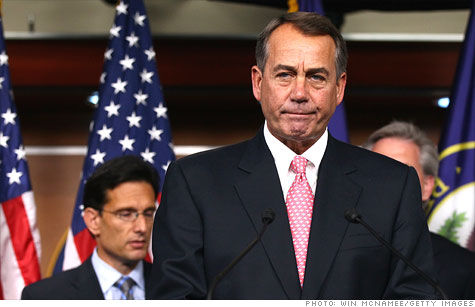
The House approved the debt ceiling bill Monday evening.
WASHINGTON (CNN) -- The House approved a last-minute deal to raise the debt ceiling on Monday that will impose sweeping spending cuts, while narrowly averting an unprecedented national default.
The agreement calls for up to $2.4 trillion in savings over the next decade, raises the debt ceiling through the end of 2012 and establishes a special congressional committee to recommend long-term fiscal reforms.
The House vote was 269 to 161. The Senate is expected to take up the measure on Tuesday at noon, when the measure needs to reach President Obama's desk.
If the current $14.3 trillion debt limit is not increased by that point, Americans could face rapidly rising interest rates, a falling dollar and shakier financial markets, among other problems.
"This process has been messy," Obama said in announcing the deal Sunday night. "It's taken far too long ... [but] ultimately the leaders of both parties have found their way toward compromise."
It remains unclear whether congressional leaders have the votes to ensure the bill's passage, particularly in the House.
A number of Republicans are worried about cuts in defense spending and the lack of a required balanced budget amendment to the Constitution. Democrats are livid over the extent of the deal's domestic spending cuts, as well as the absence of any immediate tax hikes on wealthier Americans.
"We're very concerned that (the) bill that makes these big cuts and has ... not one red cent from the wealthiest people in our country -- no revenue," said House Minority Leader Nancy Pelosi. It's "very disconcerting."
This "may be the single worst piece of public policy to ever come out of this institution," declared Rep. Maxine Waters, a Democrat.
House Speaker John Boehner told skeptical conservatives the deal is a victory for greater fiscal restraint.
"It shows how much we've changed the terms of the debate in this town," the Republican said Sunday night.
The agreement revolves around a two-stage process.
The first stage includes $917 billion in savings, including a roughly $420 billion reduction in the national security budget. The cuts would be accompanied by a $900 billion increase in the debt ceiling.
Because of the pending Tuesday deadline, Obama would have immediate authority to raise the debt ceiling by $400 billion, which will last through September, according to the White House.
The other $500 billion increase in the debt limit would be subject to a congressional vote of disapproval that can be vetoed by Obama.
In the second stage, a special joint committee of Congress would recommend further deficit reduction steps totaling $1.5 trillion or more, with Congress obligated to vote on the panel's proposals by the end of the year.
The committee would comprise 12 members: Six from each chamber, equally divided between Democrats and Republicans. The panel's recommendations would be due by November 23 and guaranteed an up-or-down vote without amendments by Dec. 23.
If the committee's recommendations are enacted, Obama would be authorized to increase the debt ceiling by up to $1.5 trillion. If the recommendations are not enacted, Obama can still raise the debt ceiling by $1.2 trillion. At that point, however, a budget "trigger" would kick in, imposing mandatory across-the-board spending cuts matching the size of the debt ceiling increase.
The cuts would be split between defense spending and non-defense programs, an unpopular formula intended to motivate legislators to approve the committee's recommendations.
In a key concession to Democrats, benefits from entitlements including Social Security, Medicaid, Medicare -- as well as veterans benefits -- will be exempt from any immediate cuts. ![]()
| Overnight Avg Rate | Latest | Change | Last Week |
|---|---|---|---|
| 30 yr fixed | 3.80% | 3.88% | |
| 15 yr fixed | 3.20% | 3.23% | |
| 5/1 ARM | 3.84% | 3.88% | |
| 30 yr refi | 3.82% | 3.93% | |
| 15 yr refi | 3.20% | 3.23% |
Today's featured rates:
| Latest Report | Next Update |
|---|---|
| Home prices | Aug 28 |
| Consumer confidence | Aug 28 |
| GDP | Aug 29 |
| Manufacturing (ISM) | Sept 4 |
| Jobs | Sept 7 |
| Inflation (CPI) | Sept 14 |
| Retail sales | Sept 14 |